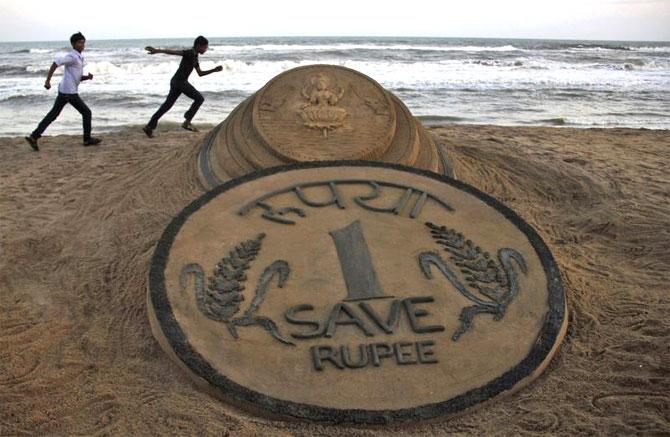
Though the markets are likely to take central bank head Raghuram Rajan's exit in their stride -- analysts say that over the medium term the rupee could see turmoil given the upcoming $20-billion outflow in Q4CY16 as the three-year Foreign Currency Non Resident deposits mature.
FCNR account is a term deposit account that can be maintained by NRIs (non-resident Indians) and PIOs (persons of Indian origin) in foreign currency.
Thus, FCNRs are not savings accounts but fixed deposit accounts.
Monsoon, analysts say, is another crucial factor that will affect inflation over the medium term.
At the global level, they remain mindful of the upcoming Brexit (Britain's referendum on European Union) vote, oil prices, and the monetary policies of global central banks.
Rajan, they agree, has played a big role in building India's credibility among the international investment community and his exit would disappoint many investors.
However, they do not believe this is the end of the "India story".
"The government's policies to contain food inflation have played a large role in containing overall inflation.
"The future will depend on who the successor is.
The immediate near-term impact is negative for the Indian rupee and equity markets, especially in the context of the upcoming Brexit worries and large dollar outflow worries as NRI deposits mature.
"We continue to maintain our cautious view on the market owing to the mismatch between valuations and fundamentals," says Mahesh Nandurkar, India strategist, CLSA.
Though analysts were surprised by the timing of the announcement, especially ahead of the Brexit vote, they do not expect a lasting medium-term impact. On the contrary, some experts did expect Rajan to exit office.
"I think the development is unfortunate but not a complete surprise since there was a lot of criticism of the monetary policy being too tight. The development is more a negative for the currency than for the stock market," said Christopher Wood, managing director and equity strategist at CLSA, in an e-mailed response.
As regards reforms, analysts expect some delay in the formation of a monetary policy committee, bank restructuring, and allowing repo transactions in the corporate bond markets.
However, they expect the central bank to remain watchful of inflation.
"Although the news is negative in the near term, we do not expect a lasting medium-term impact.
"The flexible inflation targeting framework is intact and with the move to committee-based decision-making underway, we do not believe policymakers can turn a blind eye to inflation, irrespective of who fills the head's chair," said Sonal Varma and Neha Safar of Nomura in a report.
"The news is a negative for Indian rupee.
"Given that this was not broadly expected by the market, we expect the rupee to temporarily underperform in the region," they add.
Firming up of international commodity prices, particularly of crude oil; implementation of the seventh pay commission report; upturn in inflation expectations of households and corporates; and stickiness in inflation excluding food and fuel were some of the reasons the central bank had cited for maintaining status quo on key rates while reviewing the monetary policy earlier in June.











